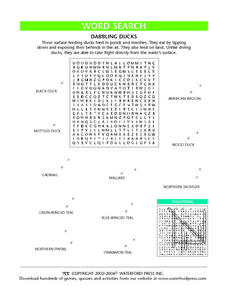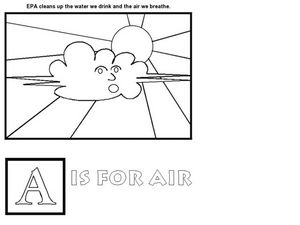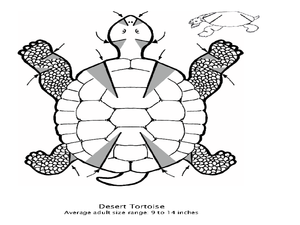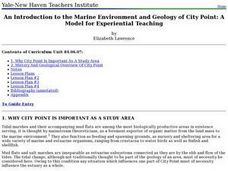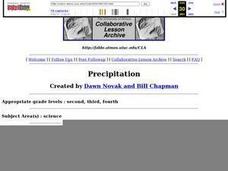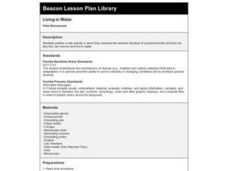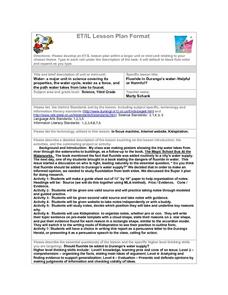Curated OER
Fire Extinguishers-Word Search
In this fire extinguisher word search worksheet, learners find a total of 14 related words after reading a short passage about fire extinguishers. Students then color a picture the correct colors, based on a picture they find of an...
Curated OER
Dabbling Ducks
In this science worksheet, learners find the names of 10 dabbling ducks in a word search puzzle. These are ducks that do not dive, but feed on the surface of the water. The word bank has a detailed color drawing of each duck.
Curated OER
The Spring Peepers are Back
In this frogs and toads worksheet, students examine detailed color pictures of 7 varieties of amphibians. Students write the name of each frog or toad on the line. There is no word bank.
Curated OER
A is for Air
In this air pollution worksheet, learners read the phrase 'EPA cleans up the water we drink and the air we breathe, and 'A is for Air.' Students then color the picture of the sky, cloud, and sun.
Curated OER
Diamond Terrapin Fun Facts
In this animal worksheet, students complete 6 pages of activities and exercises pertaining to the diamondback terrapin. Students read about the life cycle, study habitat maps and color and cut out a three dimensional turtle.
Curated OER
Natural Dyeing with Plants - Scientific Method
Students study the components of scientific investigation by planning and carrying out an experiment in natural dyeing, seeing if different kinds of metal dye pots affect the color one gets from the same plant material.
Curated OER
An Introduction to the Marine Environment and Geology of City Point: A Model for Experiential Teaching
Students begin the lesson by researching the history of City Point, Connecticut. Using a map, they color areas they were asked to find and discuss why the areas are important to the community. As a class, they are shown recent slides...
Curated OER
PLANT PARTS WE EAT
Students identify an assortment of vegetables and learn how to locate the parts humans use for food. Students identify the plant parts we eat. Students color the pictures on their worksheets as provided. Students match the plants to the...
Curated OER
Where in the World is Carbon Dixoide?
Students conduct experiments designed to detect the presence of CO2 by using a BTB that changes color (blue to yellow) in the presence of CO2. First, students experiment with the CO2 from combining vinegar and baking soda. In part two,...
Curated OER
Bible Activities
In this religious worksheet, learners complete various activities related to the Bible. For example, students color in an illustration from the Bible and solve a related crossword puzzle. Learners also match animals to their homes in a...
Curated OER
From Wheat to Bread
Young scholars complete a sequence activity to explore wheat processing. In this wheat processing lesson, students color and cut out the pictures of images about the process of forming bread from wheat. Young scholars order the pictures...
Curated OER
Natural Resources and Your Christmas Tree
In this natural resources and your Christmas tree worksheet, students read about the raw materials used to make items associated with Christmas trees, match 12 items with materials, then color a picture.
Curated OER
Develop a Bird Feeder Watch List
Students explore biology by identifying animals on their school ground. In this bird species lesson, students create and utilize a simple bird feeder to attract birds near their classroom at which point they observe the color, size and...
Curated OER
Would You Drink This?
Students examine how they affect water quality of those who live downstream after identifying rivers and river basins in Kansas.
Curated OER
Underwater Picture of the Hudson River Estuary
Students identify important aspects of water quality such as slainity and turbidity. They test two of the water quality parameters and determine the quality of the water. In addition, they construct two sets of graphs based on data...
PBS
Make a Balloon Globe
"We've got the whole world in our hands," is what your students will be singing after completing this fun geography activity. Using the included templates for the seven continents and a balloon, they create their very own globes.
Curated OER
Science: Water States
First graders investigate the various forms of water. They discuss the properties of water. They discover examples of water's various states and locate other solids, liquids, and gases in their homes.
Curated OER
Precipitation - Pot of Ice/Pot of Boiling Water Experiment
Students observe an experiment where a pot of ice is held over a pot of boiling water. They predict what will happen and then share what they see as the experiment takes place. Then the concept of condensation and precipitation is...
Curated OER
Living in Water
Fourth graders perform a lab activity in which they examine the external structure of a preserved fish and find out why fish can survive and live in water. They perform a lab which is guided by a worksheet imbedded in this plan.
Curated OER
Water
In this water instructional activity, students compare and contrast elements and compounds. Students define chemical symbols, chemical formulas, and chemical properties. This instructional activity has 19 short answer questions.
Curated OER
Fluoride in Durango's Water-Helpful or Harmful?
Third graders complete several activities in their quest to find out about the addition of fluoride to city water. First, they create a guide sheet to help organize notes. The next two steps involve taking notes through guided practice....
Curated OER
Water Testing
In this water testing pre-lab worksheet, students describe positive ions, precipitate, and the Tyndall effect. This worksheet has 14 short answer questions.
Curated OER
Tempera/chalk painting
Third graders investigate and accurately interpret with cupporting evidence the artwork of Claude Monet. They choose what they will paint. Students draw a rough draft on paper. They produce interseting looking "brush strokes", where...
Curated OER
Watercolor Leaves
Students explore autumn leaves. In this autumn lesson plan, students read a story about fall and discuss why leaves change. Students examine fall leaves and trace leaves onto paper. Students may use watercolors to decorate their leaf.



